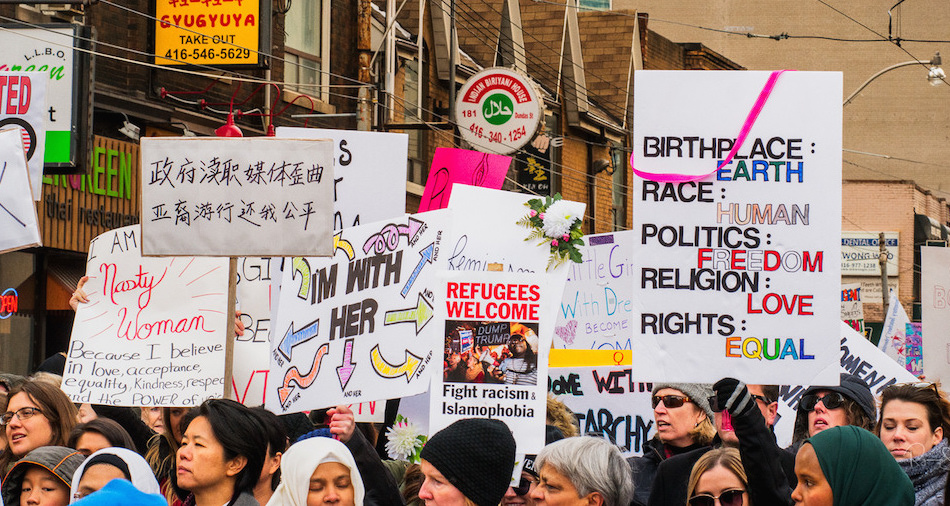Despite the cold of Toronto’s first snowy day of the winter, I, along with about 2,000 others, took to the streets on January 19 for the Women’s March on: Toronto — one of hundreds of similar marches across the U.S. and Canada.
It was the most spirited march I’ve been on in years, in part because of the cold, in part because of a great group of passionate speakers, and in part, I hope, because people are getting the idea that radical women are the best way out of this mess.
The first Women’s March on Washington in 2016 was held to protest the inauguration of Donald Trump as U.S. president. The success of women’s marches led to a significant number of young, kick-ass women of colour being elected to the U.S. Congress this fall.
One of the newly elected, Alexandria Ocasio-Cortez, spoke at the New York Women’s March this year. Justice is not just about identity, she said, “It’s about the water we drink, the air we breathe, how much ladies are being paid, whether we can stay with our children after their birth.” Ocasio-Cortez is outlining a full program for social change that includes economic as well as environmental justice.
Her focus on broad policy is mirrored in the policy platform put out by the U.S. Women’s March. The organization’s platform covers a wide range of issues, including stopping violence against women and femmes, ending state violence, securing reproductive rights and justice, racial justice, LGBTYQIA rights, immigrant rights, economic justice and workers’ rights, civil rights, disability rights and environmental justice. It also highlights three overarching objectives — universal health care, passing the Equal Rights Amendment and ending U.S. involvement in wars.
The platform is a vision, not only of an intersectional women’s movement, but of a highly political, progressive social movement. What emerges here is women fighting for not only gender-specific issues. What we’re seeing is a movement poised to also lead the fight for social, racial, economic and environmental justice, as well as for peace.
In Toronto, the focus was on the policies of the Doug Ford provincial government. Kavita Dogra, one of the event organizers, told me that policies “that disproportionately impact vulnerable and marginalized communities” were central. The slogan of the march was, “We won’t go back!” with an emphasis on Ford’s attempt to turn back advances in sex education and on his cutbacks to women’s centres and sexual assault centres. In other Canadian cities, the focus was also on local issues.
There are differences both in Canada and the U.S. The group in Toronto, like groups in some other cities, see themselves as grassroots local organizers and have dissociated from Women’s March Canada, a group they see as a top-down, corporate group. In the U.S. there are two national organizations whose differences are much bigger.
The attacks against the U.S. Women’s March for anti-Semitism are not surprising given the radical politics emerging from what initially looked like a Democratic Party operation. The only legitimate concern here is the support of one of the Women’s March leaders, Tamika Mallory, for Louis Farrakhan, the Nation of Islam leader known for anti-Semitism, sexism and homophobia.
Mallory has apologized and the march has placed the fight against anti-Semitism front and centre in its policy statement, alongside racism and Islamaphobia. Yet the media continues to repeat the charges of anti-Semitism against the organizers.
The original marches in both U.S. and Canada in 2016 were criticized as being white-dominated and for excluding other marginalized communities. Today, organizers and speakers at the Women’s March on: Toronto, as well as those in many other cities, are making efforts to be more inclusive.
The politics of the women’s march are increasingly embracing this diversity. Keeanga-Yamahtta Taylor, the author of From #BlackLivesMatter to Black Liberation, has analyzed the changes in the U.S. women’s movement.
“Indeed, if our objective is to build a multiracial women’s movement that is truly representative,” Taylor wrote in The Nation in January, “then there is much to be embraced in the model that the Women’s March has painstakingly begun to build.”
Taylor, an assistant professor of African American studies at Princeton University, continued, “While some critics argue that this model involves taking on too many issues, this betrays an old and stagnant view that helped to marginalize Black and Latina women from feminism in an earlier age.”
Seeing a major U.S. social movement adopt such broad progressive feminist politics can only be seen a sign of hope in what so often appears to be a dismal political time.
Judy Rebick is one of Canada’s most celebrated and well-known feminist thinkers, critics and writers. She is the founder of rabble.ca. This article was first published in Herizons Winter 2019 and is reprinted here with permission.
Help make rabble sustainable. Please consider supporting our work with a monthly donation. Support rabble.ca today for as little as $1 per month!




